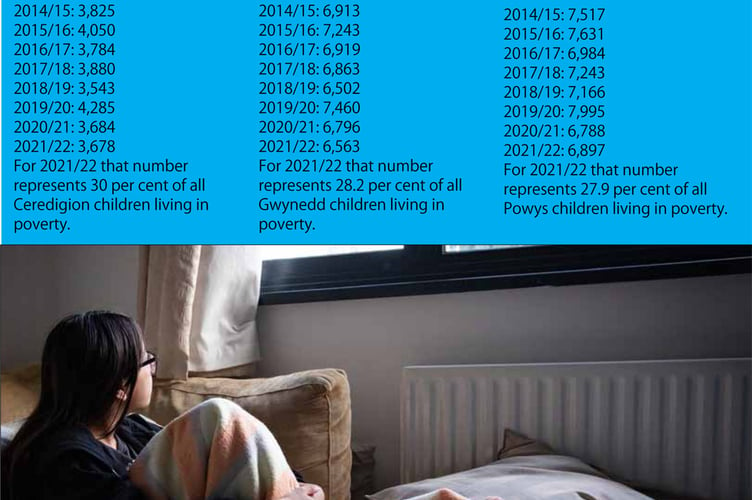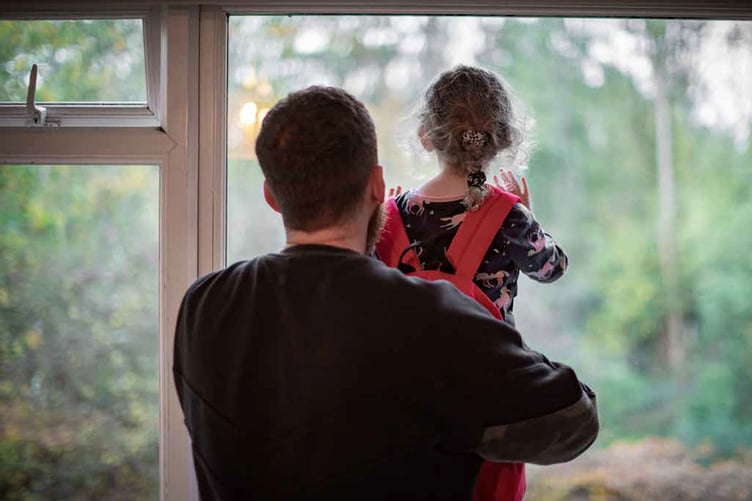THOUSANDS of children in Ceredigion, Gwynedd and Powys are living in poverty, new estimated data reveals, with the problem affecting more than one in four youngsters throughout mid and north Wales, amid warnings of that number growing as authorities attempt to tackle the “pervasive” issue.
New analysis by Loughborough University for the End Child Poverty Coalition reveals that more than one in five children live in poverty across all Welsh local authorities, with that figure rising to as high as 30 per cent in Ceredigion, 28.2 per cent in Gwynedd, and 27.9 per cent in Powys.
The data shows that poverty rates are highest in Blaenau Gwent (30.3 per cent) and Ceredigion (30 per cent), but even in Monmouthshire, the local authority with the lowest child poverty rates, more than one in five children live in poverty (21.4 per cent).
The data estimates that 3,678 children in Ceredigion were living in poverty in 2021/22 – the last year that data is available for.
That figure is slightly down from the estimate 3,825 back in 2014 – with the county estimated to have had at least 3,500 children living in poverty over the previous eight years.
In Gwynedd, 6,563 children were estimated to be living in poverty in 2021/22 – slightly down from 6,913 in 2014.
The county saw an average of 6,800 children living in poverty for each of the past eight years.
The overall number in Powys was also down from 7,517 in 2014 to 6,897 in 2021.
On average over the past eight years, more than 7,000 children are estimated to have been living in poverty in the county.
Calls have been made for more to be done to tackle the problem, however, as concerns are raised that those numbers will spike in the data for 2022/23 amid the ongoing cost of living crisis.
“The latest data on local child poverty after housing cost is for the year ending March 2022,” a report into the findings said.
“The data does not, therefore, cover the period during which the cost-of-living crisis really took hold, nor the period of extremely high and rising inflation that has been particularly prominent in relation to the costs of food and fuel.”

Ceredigion County Councillors have called the level of child poverty in the county a “real concern” and “one of the biggest challenges” Ceredigion faces.
Ceredigion MP Ben Lake said it was “alarming that Ceredigion ranked second in Welsh child poverty levels.
“Poverty is often imagined as an urban issue, but austerity has let it thrive in our villages and towns,” he said.
“Urgent government action is needed to eradicate this scourge from our communities.”
Last year, Powys County Council launched a Child Poverty Task Force.
Powys County Council’s Deputy Leader and Cabinet Member for a Fairer Powys, Cllr Matthew Dorrance, said: “We cannot build the stronger, fairer, greener Powys we want without tackling child poverty and its causes.
“I’m determined to bring council services, partners and communities together to find a local plan to tackle poverty and increase social mobility.”
A report by the Royal College of Paediatrics and Child Health (RCPCH) outlined that “data consistently shows that poverty and inequality impact a child’s whole life, affecting their education, housing and social environment and in turn impacting their health outcomes,” with “indicators revealing a widening gap between the health of children from wealthy and deprived backgrounds.”
The key indicator used to assess child poverty is the percentage of children living in households below 60 per cent of the median UK household income after housing costs.
The Welsh Government’s Child Poverty Strategy defines poverty as a “long-term state of not having sufficient resources to afford food, reasonable living conditions or amenities or to participate in activities that are taken for granted by others in their society.”
An earlier iteration of the strategy said that the Welsh Government “has the ambition to make sure no child is living in poverty by 2020” – yet thousands of children continue to go without food, clothing and safe housing in 2023.
Dr Steffan Evans, Head of Policy (Poverty) at the Bevan Foundation said the new figures “highlight how poverty is a problem in all Welsh communities.”
“Blaenau Gwent and Ceredigion are very different in many ways but with more than three in ten children living in poverty both local authorities, the latest data highlights the need to view poverty as a national problem not an urban/ rural problem or a valleys/ cities problem,” he said.
“Across the whole of Wales 27.9 per cent of children live in poverty after housing costs.
“When looking before housing costs a staggering 79.8 per cent of children living in poverty live in working households.”
Claire Atchia McMaster, Director of External Affairs at poverty charity Turn2us, said: “Poverty is not a problem of the past and although these statistics are shocking, we believe poverty can be solved. “The fact that seven in ten children experiencing poverty are in working households is a symptom of low paid unstable jobs and benefits that haven’t kept up with the true cost of living.
“This study shows that financial security goes beyond people’s ability to budget or their individual drive to succeed, it’s our economy and social safety net that aren’t working properly.
“These findings provide a compelling reason for the Welsh Government to make urgently needed updates to its Child Poverty Strategy, because even one child without enough to eat is one too many in 2023.”
The report also highlights that children from larger families are significantly more likely to live in poverty.
In 2021/22, the UK poverty rate among children with two or more siblings was 42 per cent, compared with 23 per cent and 22 per cent among children in families with one or two children. “With so many children living in poverty, the need to take action has never been greater,” the report concluded.
Dr Steffan Evans added: “At a UK level the End Child Poverty Coalition is calling for the two-child limit for those claiming Universal Credit to be scrapped, given the clear link between the policy and child poverty rates in larger families.
“In Wales, the Welsh Government is currently working on updating its Child Poverty Strategy.
“The latest analysis makes it clear that this new strategy must be accompanied by action that will help put money in families’ pockets and improve access to services.”
Jane Hutt, the Welsh Government Minister for Social Justice said: “Tackling poverty and inequality are fundamental to the purpose of the Welsh Government.
“I am committed to driving change in this area to make a positive impact on the lives of children and their families in Wales.
“We have made significant investment in a range of policies and programmes to promote prosperity, prevent and mitigate poverty and reduce the number of children living in poverty in Wales.
“Despite this investment, poverty has remained a pervasive issue.
“We expected levels of poverty to increase considerably as a result of our exit from the European Union, the economic shocks arising from the pandemic and the current cost of living crisis which have had such a profound impact on the economic well-being of vulnerable households in Wales.
“I have given a commitment to refresh our Child Poverty Strategy so that it better reflects the circumstances in which we find ourselves.
“It will underline a renewed undertaking to support those who need it most using every lever available to the Welsh Government.
“The scale of the undertaking to both prevent and lift people out of poverty in Wales is immense.”
Acting leader of Plaid Cymru Llyr Gruffydd MS said that child poverty is a “national problem which requires a national solution.”
“The re-introduction of child poverty targets would re-focus the attention of decision makers and as the Bevan Foundation argued, provide an opportunity to develop a clear and coherent vision of how it intends to reduce the number of people trapped in poverty in Wales,” he said.
Mid and West Wales MS and Welsh Liberal Democrat Member of the Senedd Jane Dodds called the figures “a damning indictment of decades of failure by Government in Cardiff Bay and London to get to grips with child poverty.”
“Our social security system is not working as it should, and it is driving people further into poverty,” she said.
“By cutting benefits for thousands of families across the UK, this Conservative Government has shown its true colours.
“We need urgent action by Labour and Conservative politicians to get money into people’s pockets, make housing more affordable, and invest in a fairer social security system for us all.”



_cropped.jpeg?width=209&height=140&crop=209:145,smart&quality=75)

Comments
This article has no comments yet. Be the first to leave a comment.